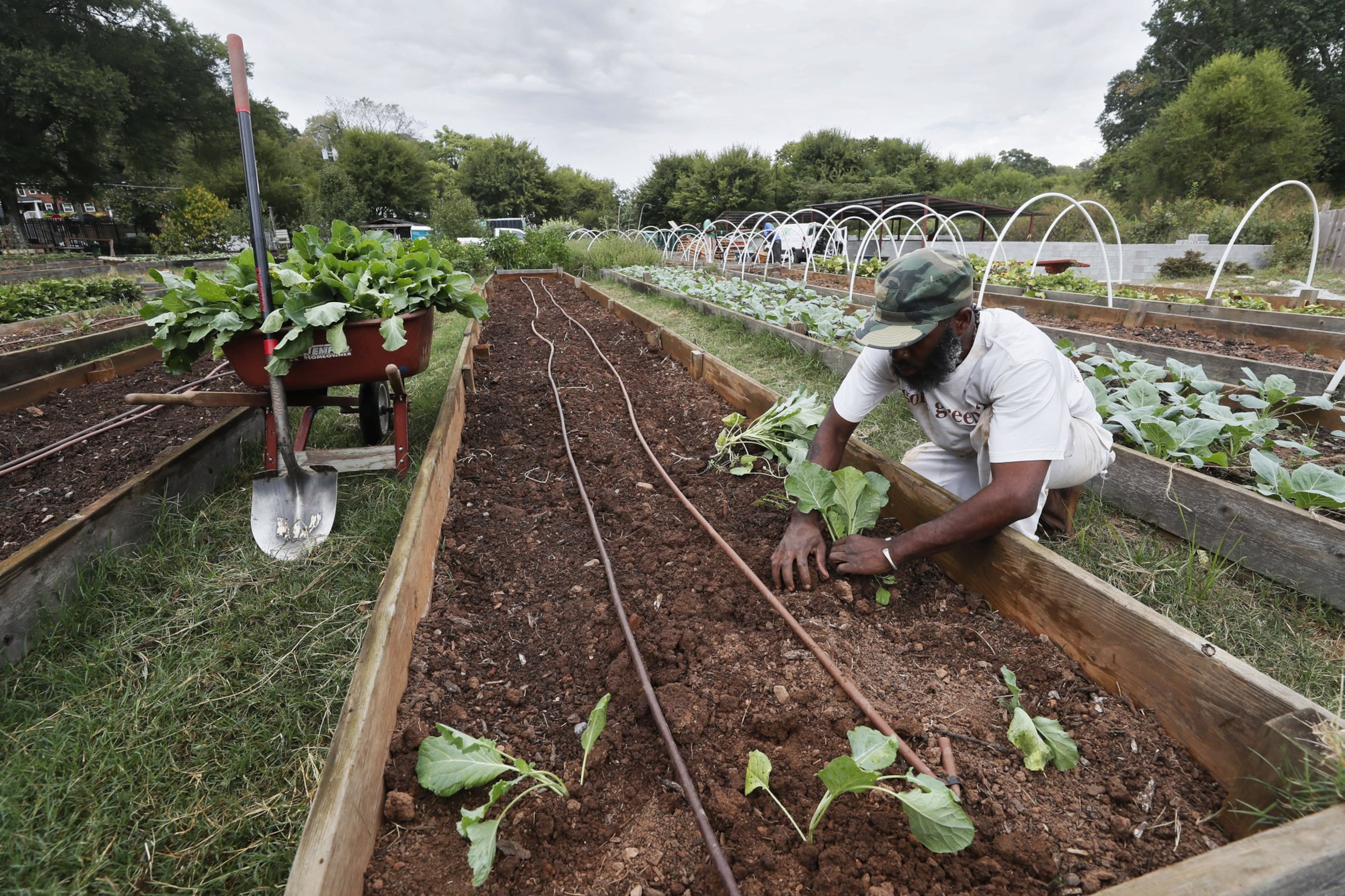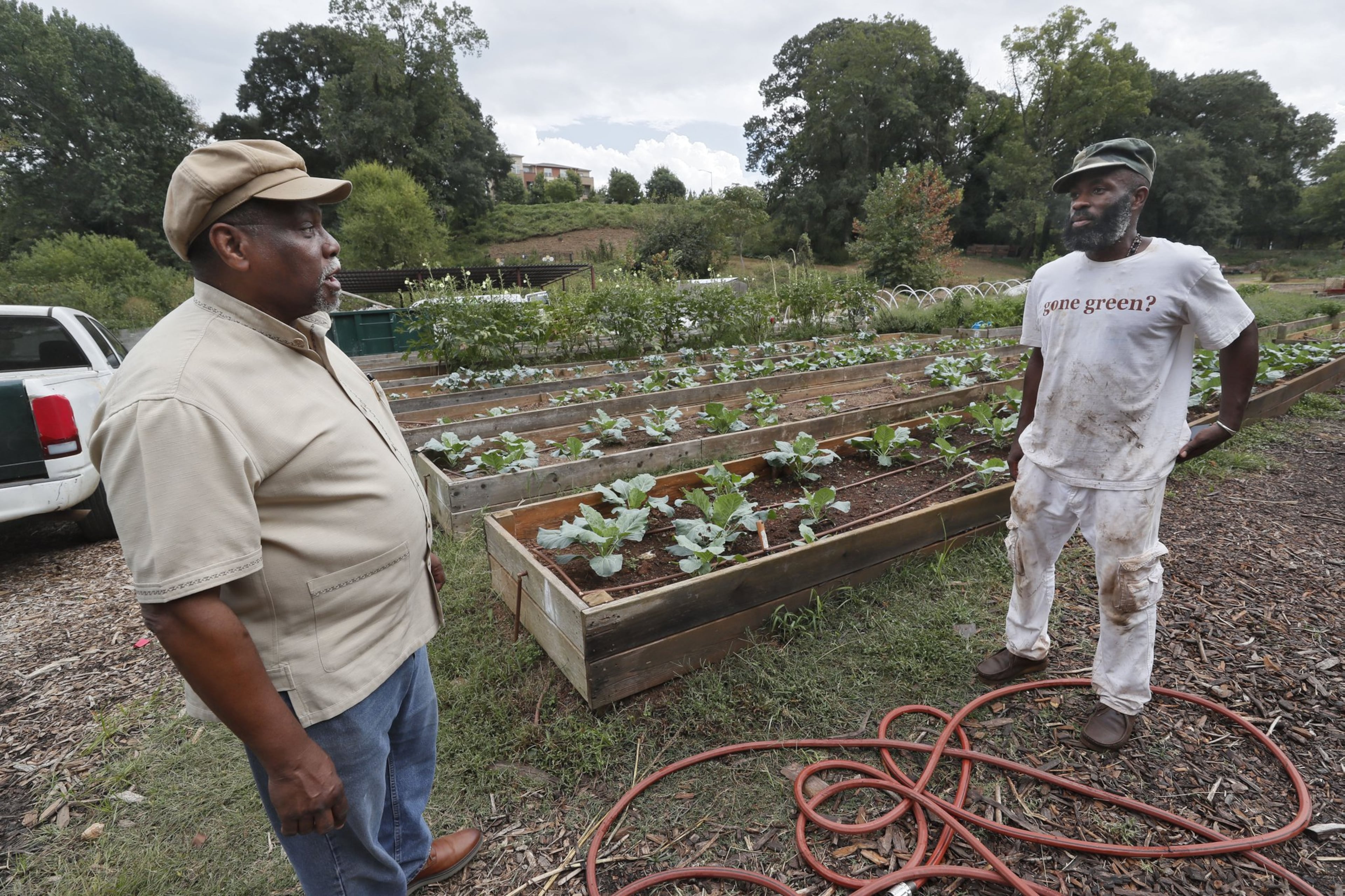Here’s how 1 man’s work in urban farming began with a message from God

K. Rashid Nuri’s food rebellion began with a message from God.
He was in the library at Harvard University writing a paper when he had his “burning bush” experience.
The message was to “learn everything about food from the seed to the table.”
And he wanted to plant the seeds to help others build stronger and healthier communities through agriculture.
In five decades, Nuri has traveled to 36 nations and started one of the largest urban farms in Atlanta.

The 71-year-old Nuri, who started the Truly Living Well Center for Natural Urban Agriculture in 2006 in the backyard of a home in Riverdale, has traveled the world to see how local food economies work.
He retired from TLW in 2018, recently published his autobiography, “Growing Out Loud: Journey of a Food Revolutionary,” and is the subject of a new documentary that is making its way around the film festival circuit.
The documentary by Atlanta filmmaker Malena Cunningham Anderson, “SEED: One Man’s Journey to Grow Food, People and Community,” recently received the “Audience Award” during the BronzeLens Film Festival and an “Exceptional Merit of Excellence Award” at the WRPN Women’s International Film Festival.
>> READ | Atlanta’s Food Forest services communities without a grocery store
The Riverdale home was owned by one of three African American women he met while in Ghana and who decided to invest in his dream. The yard was too shady, though, not conducive to growing foods. Subsequently, the farm moved several times before starting in East Point and later, in the West End.
“This is an alternative to the agricultural system as we know it,” said the 6-foot-1 Nuri, who tugs on the brim of his trademark newsboy cap. “The commercial ag system in this country is broken. It doesn’t work. The food that is being produced is killing people. It’s not healthy and we’re making that change.”
The change is fueled in part by people living farther from their food sources.
Roughly 82% of the U.S. population lives in urban areas, up from 64% in 1950, according to the University of Michigan’s Center for Sustainable Systems. By 2050, that figure is projected to be 90%.
That means that food production will follow.
TLW today has two farms — its Collegetown farm on Lawton Street and Westview Drive and the other in East Point; both provide food to the community through weekly sales and educational opportunities. The farms are tended to by volunteers and employees.
Nuri retired as head of the organization last year.
The project — part of efforts to revitalize and stabilize the city’s Westside — involves building bridges of trust among all parties involved.
>> READ | Atlanta creates first food forest in Georgia, largest in U.S.
“The future is small farms and urban agriculture,” said Nuri, who travels to different communities to speak to groups about the importance of community building around urban farming.
Nuri is one of the smartest guys in urban agriculture, said Bill Bolling, founder of the Atlanta Community Food Bank and chairman and senior adviser to the Food Well Alliance, a network of local leaders who work to build successful community gardens and urban farms. “He’s also a disrupter, who really doesn’t take no for an answer. He doesn’t allow people to talk down to him. He has his ideas and he really pushes through and makes it happen. He always had a vision and knew from day one what he was going to do. We’re just lucky he settled in Atlanta.”
There are 300 community gardens and 50 urban farms in metro Atlanta, according to Food Well’s website.
>> PHOTOS | Urban farming in Atlanta
Although Nuri no longer runs TLW, he occasionally visits and shares his ideas with volunteers and growers as he walks past the raised beds of pesticide-free collards, broccoli, herbs and peppers.
The main farm, on the Westside, is carved out of 7 acres in a community located close to the Atlanta University Center.
The nearest big chain grocery stores are not walkable for many of the lower-income, elderly residents.
The farm sits in the midst of one of Atlanta's food deserts, defined by the U.S. Department of Agriculture as low-income communities with a substantial number or share of residents with little — if any — access to stores selling healthy and affordable foods. Studies have shown that a lack of healthy foods can lead to health complications like diabetes, obesity, cancer and heart disease.
>> RELATED | Where are metro Atlanta’s food deserts?
The farm is built on what used to be a housing project. Today, there are pockets of gentrification. New homes. Renovated homes. The Atlanta Beltline.
“What struck me most was his drive and commitment to excellence in doing the work,” said Anderson, who wrote and directed the “SEED” documentary about Nuri. “Mr. Nuri wants African Americans to come to a new way of thinking about our heritage of working the land as enslaved people and recognize that as long as others control the food, they can control you.”
She remembers a conversation with Nuri about the relatively low number of thefts from the farm.
He told her if people took food from the farm, at least they were eating healthy.
The farm, lined by fruit trees along the fence, is an oasis for area residents. One man is replanting greens. Another is building new composting facilities. There are also plans to add a children’s area. Truly Living Well also offers education classes, a boot camp and chef presentations on eating healthy. School children also visit the garden.
“When I think of Rashid, I think of visionary, pioneer and trailblazer,” said Carol Hunter, who succeeded Nuri at TLW.
“It’s our goal to make it sustainable because our community has a need for quality fresh food,” she said.
Funding can be challenging. In addition to grants, Hunter said the farms try to diversify their income stream, including selling food, special event rentals, tours and classes.
“Although the number of local farms and farmers markets are growing, there continues to be a need for affordable fresh food, education around food access and opportunities to learn how to grow your own food,” she said.
Even before Hunter took over, raising money would be an issue.
“I didn’t go to people and say we need money to do (something), I would go to people and say I need money to do what I’m doing better,” Nuri said.
There were “plenty” of times he had trouble making payroll.
“The issue was cash flow,” he said. “When is the money coming? You can tell me in May that you’re going to give me $100,000, but the question is when do I actually receive it so I can use the money?”
Tony Ray, who lives in the area, said he’s bought collard greens for his grandmother. The presence of the farm “makes you think about what you take in and how that changes your body.”
Every Friday, its gates are opened to let people come in to buy fresh foods. A second farmers market is held weekly at the Carter Center.

A self-described “child of the ’60s,” Nuri, who was born Keith Freeman Robins in Boston, studied the thinking of leaders like Jomo Kenyatta, the first president of an independent Kenya, and Julius K. Nyerere of Tanzania, who preached self-reliance and Ujamaa, African socialism.
“We’re talking black power, nation building, and that included controlling your food sources and land,” said Nuri, who traces his paternal family roots to the Maroons, escaped slaves who fled the Spanish and carved out a life in the mountains of Jamaica. “How we grow our food needs to be an integral part of how our communities grow and how our cities grow.”
Agriculture “created such freedom. In order to call yourself a nation, you have to be able to feed, clothe and shelter your people.”
Bolling of the Food Well Alliance said he and Nuri are kindred spirits when it comes to urban agriculture.
It can change a neighborhood.
Residents will take pride in the farm or garden and the community. It builds relationships and commerce.
“What’s so interesting about this movement is that young people are drawn to it,” he said. “The real focus is teaching young people about food and soil and composting and where food comes from.”
Nuri says everyone doesn’t have to have a 7-acre farm to be healthy and connected to the earth.
He advises people to start growing on the balcony, porch or kitchen window.
“This is no longer a movement,” he said. “There’s been a paradigm shift in how people look at food and food sourcing.”


